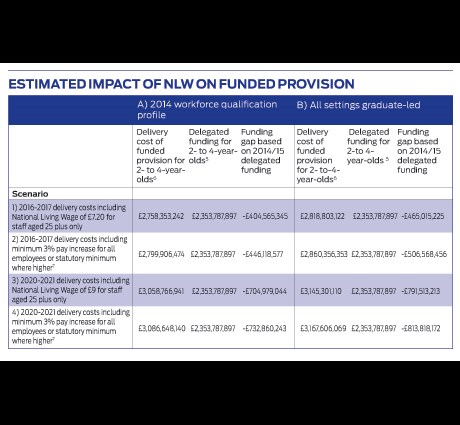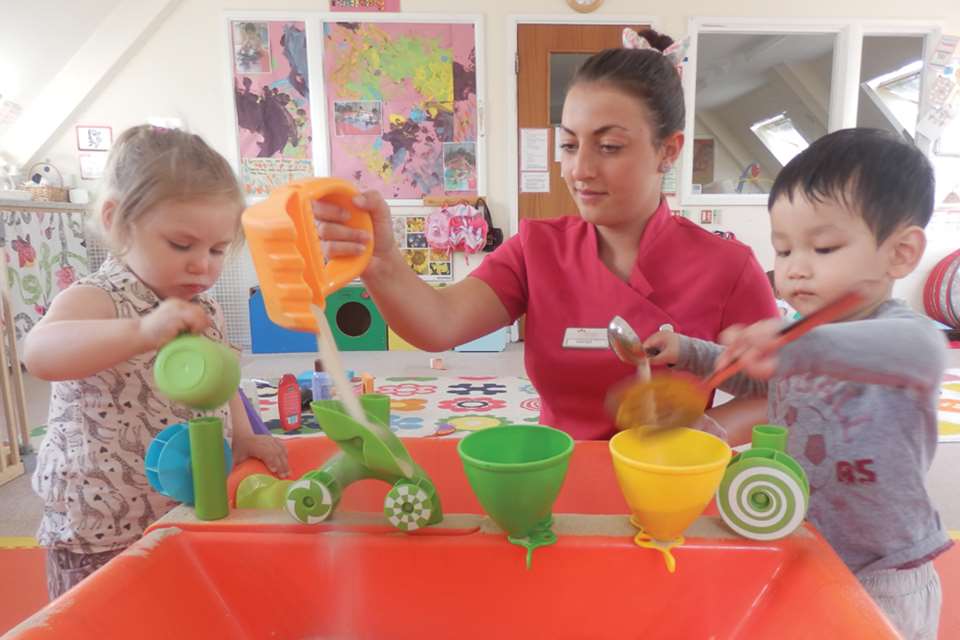Nursery Management: Recruitment - Staff wanted
Monday, September 21, 2015
A drop in the numbers applying for jobs, and in the quality of candidates, is leaving the sector floundering. Hannah Crown investigates.

Fewer people are applying for jobs in the sector, leaving nursery managers facing a 'shocking' shortage of qualified staff, Nursery World can report.
The recruitment crisis currently gripping the early years has hit such a fever pitch that recruiters are reporting significant drops in application numbers (see box) while employers are now simply unable to fill vacancies with appropriately qualified staff.
Hilary Sharples, director of quality at Ashbridge Independent School and Nursery, says she went to four different apprentice providers to try to source ten Level 3 apprentices, but was unable to find any with the GCSEs needed for them to count in ratios.
She says, 'This has been a very successful way for us to recruit some excellent practitioners in the past; however, we have had very little success recently. So few applied, and if they did candidates were without GSCEs.'
Carly Garrett, franchise operations manager at Banana Moon, says she is 'trying to recruit for 12 new nurseries between now and November and it's a daily struggle'. She has filled eight of her 24 manager and deputy manager places since starting the process in June. She says, 'I think most nurseries are experiencing a shortage of good-quality, qualified, passionate individuals to join their team. The quality of staff is just not there, and Level 3 is definitely the hardest, but it is nursery nurses up to managers. The situation is shocking'.
Toad Hall Nursery Group says that if a strong CV comes through it has to act the same or next day. Chief executive Ruth Pimentel says, 'The good quality candidates are getting snapped up very quickly. If a strong CV comes in, we have to act immediately so as not to lose it.'
Others are taking more drastic steps. Richard Bennett, co-founder of The Old Barn Day Nursery in Surrey, says, 'I used to advertise when I had a vacancy and appoint from those who applied. I can't do that now - I keep my ears and eyes open and if there's anybody who looks like they have the potential I will give them a job whether I have a vacancy or not. I don't want to be in a situation where somebody leaves and I have just a month (to find someone). You have to be really flexible.'
Ms Sharples hired three Level 2 apprentices and is giving them time off to gain GCSEs alongside their apprenticeship. Other employers are launching bespoke training, but even some of these are struggling to recruit.
Wendy Fields is fundraising and development manager at the Lloyd Park Centre in Walthamstow, which has two early years settings, a children's centre and training agency. The charity created a bespoke Level 3 Early Years Educator (EYE) course for a Level 2 candidate. This would have provided a Level 2 salary, and paid for a personal tutor and qualified assessor from the training agency as well as work-based training and workshops, and independent study and assessments over two years. It would also have incorporated the English and maths GCSE where needed. But the charity has been unable to run the course due to the lack of demand.
Ms Fields says, 'We've had three people who were interested, but we would need about ten to run the course.' She says recent recruitment efforts had netted CVs with 'nothing that suggests they would be qualified' and 'no one willing to fill in the standard application form'. She adds, 'People are saying they can't afford the EYE training, and this pays for the training and gives a mix of workshops and group discussions and reflections on group practice (on top), but we still can't get anyone on it.'
Ms Garrett, whose company Banana Moon is now considering a third-party GCSE training company so it can take people up to Level 3, thinks that quality of training and low pay are part of the reason for the lack of staff. 'They should be coming from college with some understanding of child development and they are not. I just think there have been too many qualifications and while the EYE was designed to help I also don't think childcare is drawing in the good candidates. When you are interviewing people, level of interest and engagement with children isn't there - they are just doing it because they want a job.'
Mr Bennett adds, 'I am generalising here, but candidates with an NNEB would know how to talk to children. They would know to ask them open-ended questions. Those who come out with an NVQ3 can't do that. You effectively have to train them from the start how they ought to interact with the children - how to speak to them using encouraging language, how to write.
'There is also no doubt that written English coming out of schools is not a patch on what it was. The EYE qualification (which requires English and maths GCSEs) won't make that situation any worse - until we see the results the jury must be out - but we need more than just a new course and qualification. What we need is an understanding of a higher standard being necessary. I want people when they come to work for me to be at least as good as an NQT. They are about two years off that.'
The Government, which has said it is not going to apologise for raising standards, says that the EYE qualification will raise the quality and status of the workforce and that reform will take time. A spokesman told Nursery World earlier this year that '87 per cent of the existing workforce hold a level 3 qualification and they are confident that there will be sufficient qualified staff', while adding 'ensuring children have the best start in life is a vital part of our plan for education.'

VIEW FROM THE JOBS BOARDS
Some recruitment sites have reported that a rise of more than half in the number of postings has been tempered with a significant drop in candidate numbers.
Non-specialist site CV Library, which claims to have the largest CV database in the UK, and is used by some nursery groups, reports that while childcare job postings have increased by 55 per cent since last year, the number of applications per role has dropped by 22 per cent.
'Nursery nurse' was the most commonly applied-for job and 'nursery assistant' was the most commonly advertised. Yet while 'nursery manager' is in the top five most advertised jobs, it is just 25th on the list of most applied-for jobs.
Nursery World Jobs has also seen some falls in the pool of available applicants over the past few years.
Senior sales executive Ella Stocker says the number of applications for manager roles has dropped since last year, by about a third, but this was coupled with a 13 per cent rise in applicants for the most popular job, 'qualified practitioner', between January and April and May and August of this year.
She adds that the second half of the year is showing signs of a resurgence. 'The start of the year was tough, but anecdotally it does seem that things are getting better.
'There is obviously huge competition for employers to secure the best candidates and this has put a bit of pressure on salaries, which have risen 7 per cent on this time last year from an average of £18,095 to £19,343, according to our data. I also think employers have tried various approaches and realised that there is no magic bullet - it is the same situation everywhere.'
NURSERY CHAIN PERSPECTIVE
 Chief executive of Toad Hall Ruth Pimentel says, 'It can take up to three months to recruit someone, whereas before it would take four to six weeks. We also get a lot of CVs through for Level 3 jobs from people at Level 2 or people looking for their first job in early years. So we're having to think differently.'
Chief executive of Toad Hall Ruth Pimentel says, 'It can take up to three months to recruit someone, whereas before it would take four to six weeks. We also get a lot of CVs through for Level 3 jobs from people at Level 2 or people looking for their first job in early years. So we're having to think differently.'
And, while the company doesn't have a shortage of Level 3s in any of its settings, the recovery from recession has seen occupancy levels go up and led to the opening of new rooms that need Level 3 qualified people. Like others, the company has taken on candidates without the required qualifications.
Ms Pimentel says the firm had recruited more than 40 apprentices in the past 15 months, seven of whom are signed up to do the English and maths GCSEs through Hawk Training, while the company is also running a supplementary GCSE training day in September as an extra support. All apprentices who have completed training with the company have been offered jobs.
The company recruited an HR manager two years ago, but now 'recruitment has been quite a big part of what was originally an HR job. We have created a role to make sure we recruit'. The company is moving away from reliance on direct applications and recruitment agencies to make more use of free listing sites and social media. It has also looked at its benefits package to entice staff to join, which now includes the following:
- An employee discount scheme, Toad Hall Rewards, where staff can save money on purchases. Ms Pimentel says the 380 staff have so far saved £9,500 and the scheme has been shortlisted for an award.
- Sick pay rates increase, from statutory to occupational.
- Paid time off for family emergencies.
- A week's extra holiday that can be purchased over 12 months.
Ms Pimentel adds, 'We are basically selling staff in the nursery business and this is about making ourselves a quality provider. There is the angle of being a good employer, but we can also see recruitment is becoming more and more of a challenge.
'The whole idea is upskilling the workforce and making sure childcare is high quality - but the sector hasn't had time to manage it properly.The Government is having to backtrack. It didn't plan it properly in the first place and we are suffering the consequences. Now it's pushing for a more ambitious agenda with 30 hours on top.'
THE EARLY YEARS EDUCATOR QUALIFICATION
Numbers of candidates taking the new Early Years Educator (EYE) qualification have ‘substantially declined’ in the past academic year. CACHE says that the number of registrations for Level 3 courses has dropped 44 per cent compared to 2013-14. A Pearson spokeswoman says, ‘There has been a substantial decline in entries for our EYE qualification since September 2014.’ Since bringing in the EYE in September 2014, the Government has announced a raft of changes to the rules, which have mainly comprised relaxing the GCSE entry requirements to exit or as a workforce requirement to count in ratios.Below, we have produced a timeline of the key changes plus a guide to the current GCSE rules.







